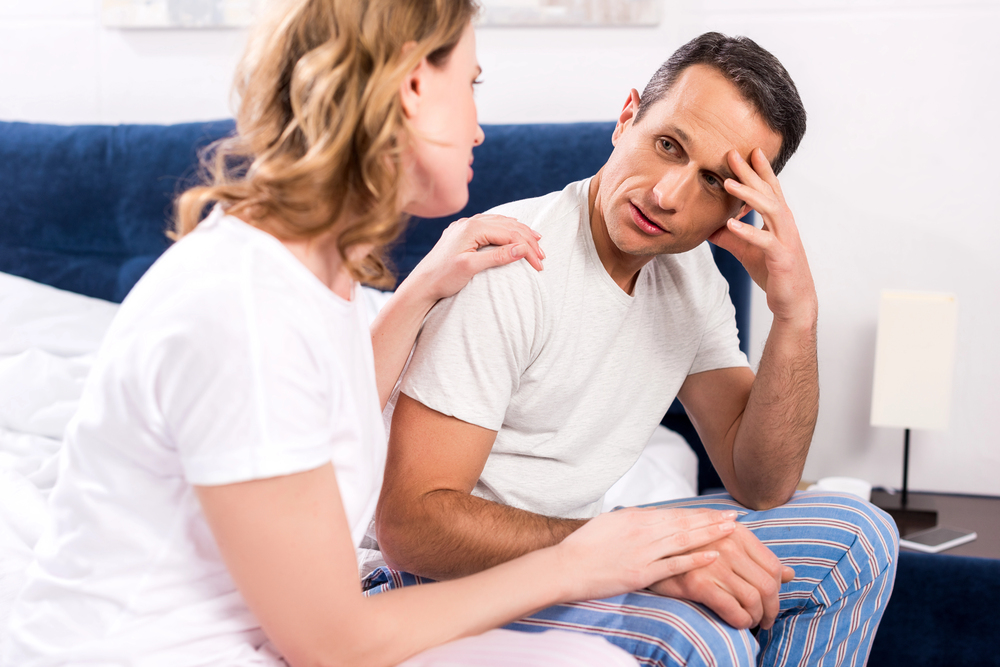A Partner's Guide To Erectile Dysfunction

Content by

Last Updated
Start a Consultation Today
Science means that ED can be optional.
No fancy packaging. No unwanted subscriptions. Delivered discreetly to your door.
Erectile dysfunction is a common issue among married men across the world. While it can be stressful or frustrating for the person experiencing it, it can also be challenging for partners. Understanding erectile dysfunction in more detail and learning how to be more supportive is essential for maintaining emotional and physical intimacy with your partner. Having open discussions together can also help to keep feelings of insecurity, potential embarrassment and guilt at bay.
This guide aims to provide partners of erectile dysfunction sufferers with the knowledge, advice and guidance to help support them. Being supportive and overcoming ED as a couple can strengthen your relationship and get your normal sex life back.
Table of Contents
- What is Erectile Dysfunction?
- What Impact Can ED Have on Relationships?
- How To Support A Partner Living With ED
What is Erectile Dysfunction?
Erectile dysfunction (ED), also referred to as impotence, is a condition when a man struggles to get and maintain an erection long enough for sexual performance. Some men may also experience a decreased sexual desire or low libido. It can occur due to heart problems, diabetes, hormonal imbalances, stress, performance anxiety or existing relationship problems. [1] ED affects men primarily over 40 years old, but it can occur in men even in their 20s. Research suggests that an estimated 4.3 million men in the UK suffer from ED. [2]
What Impact Can ED Have on Relationships?
ED can take a significant toll on relationships, marriages and partnerships, affecting emotional and physical intimacy between partners. It is often seen as a private struggle, but the effects can also be felt by partners. The condition can lead to psychological distress for the person experiencing it, including feelings of anxiety, inadequacy, low self-esteem and poor body image. These feelings can prompt a reluctance to discuss the issue, causing misunderstandings and emotional distance within a relationship.
For partners, they may feel rejected or believe that they are no longer attractive to their partner, generating feelings of low self-esteem, frustration or even anger. The lack of sexual intimacy and misunderstanding can trigger arguments, conflict and even separation if the issue is not solved. Don't be afraid to start a conversation. Talking about erectile dysfunction doesn't need to be awkward; it can actually enhance pleasure and fortify your relationship.
Being a Partner to Someone Who Has Erectile Dysfunction
If your partner is dealing with erection problems, it can be difficult to know what to do or say to them. Taking the wrong approach can worsen the situation and cause even more distance within the relationship. Some men feel embarrassed about discussing the cause of ED with their partners or discuss it in very little detail. Other men may refuse to seek help and prefer to handle it themselves.
There are several ways you can help your partner if they are suffering with ED:
Communication is Key
Don't be afraid to start a conversation. Talking about erectile dysfunction doesn't need to be awkward; it can actually enhance pleasure and fortify your relationship. Speak to your partner with compassion and understand how they are feeling as well as their concerns. Avoid blaming them for it, remember that ED is a medical condition and not a personal fault. Remind your partner that they are not alone and their condition is not a reflection of their masculinity. It is also important to take care with open communication. Make sure the time is right and tensions are low.
Educate Yourself
As a partner, you can educate yourself on certain aspects of the condition. Read online articles from trustworthy sites to learn more about the causes, symptoms, lifestyle changes and best treatments for erectile dysfunction. Partners need to be aware that ED can be caused by underlying health problems or certain medicines. It might also be worth checking if ED is a side effect of your partner’s current medication.
The more you know, the more you can support your partner with erectile dysfunction and normalise the situation. For instance, you can offer support by making the same lifestyle changes as your partner to improve their erectile function.
Suggest Treatment Options
By learning about the treatment of ED, you will come across a range of options such as healthy lifestyle changes, oral medication, penis pumps, penile injections, penile implants or even introducing cock rings. Suggest these treatment options to your partner and help him to find a treatment that suits his needs. Oral medications including Viagra, Sildenafil, Tadalafil and Cialis are effective for most users, easy to take and are easily accessible from Chemist Click.
Try to Relax and Explore Other Forms of Intimacy
Engaging in sexual activities is not the only form of intimacy. Explore other forms of intimacy such as kissing, hugging and cuddling. Find time to go on dates and focus on activities that you both find fun and satisfying. Other forms of intimacy can help strengthen the relationship and maintain levels of affection during the most challenging times.
Encourage Him to Seek Help
Encourage your partner to seek help from a medical professional. At Chemist Click, we offer a free online consultation with one of our qualified pharmacists to find an ED treatment. While some men prefer to handle it themselves, a doctor’s visit is often required to determine the root cause and the right treatment for the problem. Avoid being impatient or putting pressure on your partner to solve the problem quickly. Keep in mind that treatments for ED can take time and vary from person to person.
Provide Ongoing Support
Whatever treatment option your partner decides to embark on, let them know that you will continue to support them. Celebrating noticeable results and small victories can help motivate those experiencing ED. If your partner encounters a relapse of ED in the future, it’s important to follow the same guidelines while remaining supportive, understanding and hopeful.
5 tips that may also help your partner with ED:
- Lose Excess Weight – If your partner is overweight, shedding some pounds could help in reducing ED symptoms.
- Quit Smoking – The chances of successfully quitting smoking increase with prescribed treatments compared to going it alone.
- Maintain a Nutritious Diet and Stay Active – Implementing gradual and small changes to your diet and exercise routines can create sustainable improvements in health conditions.
- Reduce Stress and Anxiety – The demands of finances and work can make life seem too much at times. It's important to take breaks, enjoy leisure activities together, and explore new environments to nurture quality time.
- Moderate Alcohol Consumption – Heavy drinking can contribute to ED and pose other health risks as well. It's advisable to limit your alcohol intake to no more than 14 units per week consistently.
Sources
- NHS. (2023). Erectile Dysfunction (Impotence). Retrieved 21st October 2024, from: https://www.nhs.uk/conditions/erection-problems-erectile-dysfunction/
- The Urology Foundation. (2024). Erectile Dysfunction. Retrieved 21st October 2024, from: https://www.theurologyfoundation.org/urology-health/male-reproductive-organs-conditions/erectile-dysfunction/
Whilst all of our content is written and reviewed by healthcare professionals, it is not intended to be substituted for or used as medical advice. If you have any questions or concerns about your health, please speak to your doctor.
